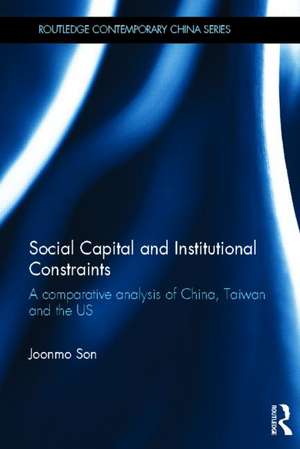Social Capital and Institutional Constraints: A Comparative Analysis of China, Taiwan and the US: Routledge Contemporary China Series
Autor Joonmo Sonen Limba Engleză Hardback – 23 iul 2012
This book uses new empirical data to test how social capital works in different societies with diverse political-economic and cultural institutions. Taking a comparative approach, this study focuses on data from three different societies, China, Taiwan, and the United States, in order to reveal the international commonalities and disparities in access to, and activation of, social capital in labor markets. In particular, this book tests whether political economic and cultural differences between capitalist and socialist economic systems and between Western and Confucian cultures create different types of individual social networks and usages. This comparison leads to Joonmo Son’s fundamental argument that the institutional constraints of a society’s political economy on the one hand, and culture on the other, profoundly impact on both the composition and utilization of social capital.
Based on rigorous statistical analysis, this book will be essential reading for students and scholars of social capital, economic sociology, and comparative politics.
| Toate formatele și edițiile | Preț | Express |
|---|---|---|
| Paperback (1) | 299.52 lei 6-8 săpt. | |
| Taylor & Francis – 16 iun 2017 | 299.52 lei 6-8 săpt. | |
| Hardback (1) | 1057.05 lei 6-8 săpt. | |
| Taylor & Francis – 23 iul 2012 | 1057.05 lei 6-8 săpt. |
Din seria Routledge Contemporary China Series
-
 Preț: 311.14 lei
Preț: 311.14 lei -
 Preț: 339.64 lei
Preț: 339.64 lei -
 Preț: 311.41 lei
Preț: 311.41 lei -
 Preț: 280.32 lei
Preț: 280.32 lei -
 Preț: 310.31 lei
Preț: 310.31 lei -
 Preț: 350.10 lei
Preț: 350.10 lei - 18%
 Preț: 1059.45 lei
Preț: 1059.45 lei - 26%
 Preț: 848.57 lei
Preț: 848.57 lei - 18%
 Preț: 1223.21 lei
Preț: 1223.21 lei - 18%
 Preț: 1060.74 lei
Preț: 1060.74 lei -
 Preț: 422.90 lei
Preț: 422.90 lei - 18%
 Preț: 954.20 lei
Preț: 954.20 lei - 18%
 Preț: 1169.66 lei
Preț: 1169.66 lei - 18%
 Preț: 1049.84 lei
Preț: 1049.84 lei - 18%
 Preț: 1217.95 lei
Preț: 1217.95 lei - 18%
 Preț: 1222.16 lei
Preț: 1222.16 lei - 25%
 Preț: 823.99 lei
Preț: 823.99 lei - 18%
 Preț: 1061.93 lei
Preț: 1061.93 lei - 18%
 Preț: 1057.89 lei
Preț: 1057.89 lei - 18%
 Preț: 1112.03 lei
Preț: 1112.03 lei - 18%
 Preț: 1008.02 lei
Preț: 1008.02 lei -
 Preț: 416.82 lei
Preț: 416.82 lei - 25%
 Preț: 823.99 lei
Preț: 823.99 lei - 18%
 Preț: 1114.70 lei
Preț: 1114.70 lei - 15%
 Preț: 702.39 lei
Preț: 702.39 lei - 25%
 Preț: 526.88 lei
Preț: 526.88 lei - 18%
 Preț: 712.13 lei
Preț: 712.13 lei - 18%
 Preț: 1065.06 lei
Preț: 1065.06 lei - 18%
 Preț: 703.09 lei
Preț: 703.09 lei - 18%
 Preț: 1060.87 lei
Preț: 1060.87 lei - 18%
 Preț: 1057.89 lei
Preț: 1057.89 lei - 18%
 Preț: 1062.98 lei
Preț: 1062.98 lei - 18%
 Preț: 1222.16 lei
Preț: 1222.16 lei - 18%
 Preț: 1055.51 lei
Preț: 1055.51 lei -
 Preț: 413.55 lei
Preț: 413.55 lei - 18%
 Preț: 1001.84 lei
Preț: 1001.84 lei -
 Preț: 386.57 lei
Preț: 386.57 lei - 18%
 Preț: 1055.38 lei
Preț: 1055.38 lei - 18%
 Preț: 1053.95 lei
Preț: 1053.95 lei - 18%
 Preț: 1061.57 lei
Preț: 1061.57 lei - 18%
 Preț: 1058.79 lei
Preț: 1058.79 lei - 18%
 Preț: 1109.18 lei
Preț: 1109.18 lei - 18%
 Preț: 1053.47 lei
Preț: 1053.47 lei - 18%
 Preț: 1053.16 lei
Preț: 1053.16 lei - 18%
 Preț: 728.24 lei
Preț: 728.24 lei - 18%
 Preț: 1055.38 lei
Preț: 1055.38 lei - 18%
 Preț: 1165.87 lei
Preț: 1165.87 lei - 18%
 Preț: 1227.38 lei
Preț: 1227.38 lei - 15%
 Preț: 701.45 lei
Preț: 701.45 lei
Preț: 1057.05 lei
Preț vechi: 1289.09 lei
-18% Nou
Puncte Express: 1586
Preț estimativ în valută:
202.26€ • 211.18$ • 167.40£
202.26€ • 211.18$ • 167.40£
Carte tipărită la comandă
Livrare economică 04-18 aprilie
Preluare comenzi: 021 569.72.76
Specificații
ISBN-13: 9780415595223
ISBN-10: 0415595223
Pagini: 192
Ilustrații: 10 black & white illustrations, 45 black & white tables, 10 black & white line drawings
Dimensiuni: 156 x 234 x 13 mm
Greutate: 0.52 kg
Ediția:1
Editura: Taylor & Francis
Colecția Routledge
Seria Routledge Contemporary China Series
Locul publicării:Oxford, United Kingdom
ISBN-10: 0415595223
Pagini: 192
Ilustrații: 10 black & white illustrations, 45 black & white tables, 10 black & white line drawings
Dimensiuni: 156 x 234 x 13 mm
Greutate: 0.52 kg
Ediția:1
Editura: Taylor & Francis
Colecția Routledge
Seria Routledge Contemporary China Series
Locul publicării:Oxford, United Kingdom
Public țintă
Postgraduate and UndergraduateCuprins
1. A Comparative study of social capital 2. Accessed and activated social capital 3. Institutional constraints 4. Theoretical models and hypotheses 5. Data, methods and measures 6. Accessed social capital among the three societies 7. Social capital and status attainment 8. Social capital and institutional constraints
Notă biografică
Joonmo Son is Associate Professor of Sociology at the National University of Singapore.
Recenzii
"Son’s book is a significant addition to the growing literature on social capital, institutions, and status attainment. Its unique institutional comparative perspective greatly advances our understanding of how political economy or culture shape people’s access to and activation of social capital for status attainment in three important labour markets with varying institutional constraints. The book is well organized and well written, suitable for upper division undergraduate and graduate students. It will be a must-read for scholars on China, Taiwan, and the US as well as social scientists interested in social capital, institutions, and social inequalities."
- Wenhong Chen, University of Texas at Austin
Asian Journal of Social Science 41, 2013.
"Son’s comparative study of social capital and institutional constraints is a solid contribution to our understanding of social capital and status attainment...this monograph is of great value to stratification specialists as well as to the broader sociological community."
-Mito Akiyoshi, Senshu University
Social Forces (Oxford University Press Journal) vol 94, no 2, December 2013
- Wenhong Chen, University of Texas at Austin
Asian Journal of Social Science 41, 2013.
"Son’s comparative study of social capital and institutional constraints is a solid contribution to our understanding of social capital and status attainment...this monograph is of great value to stratification specialists as well as to the broader sociological community."
-Mito Akiyoshi, Senshu University
Social Forces (Oxford University Press Journal) vol 94, no 2, December 2013
Descriere
This book uses new empirical data to test how social capital works in different societies with diverse political-economic and cultural institutions. Taking a comparative approach, this study focuses on data from three very different societies, China, Taiwan and the United States, in order to reveal the international commonalities and disparities in access to, and activation of, social capital in labor markets. In particular, this book tests whether political economic and cultural differences between capitalist and socialist economic systems and between Western and Confucian cultures create different types of individual social networks and usages.












